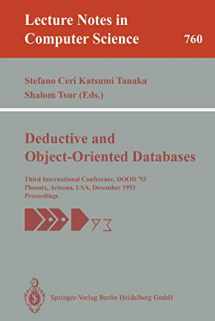
Deductive and Object-Oriented Databases: Third International Conference, DOOD '93, Phoenix, Arizona, USA, December 6-8, 1993. Proceedings (Lecture Notes in Computer Science, 760)
ISBN-13:
9783540575306
ISBN-10:
3540575308
Edition:
1993
Author:
Stefano Ceri, Katsumi Tanaka, Shalom Tsur
Publication date:
1993
Publisher:
Springer
Format:
Paperback
508 pages
FREE US shipping
Book details
ISBN-13:
9783540575306
ISBN-10:
3540575308
Edition:
1993
Author:
Stefano Ceri, Katsumi Tanaka, Shalom Tsur
Publication date:
1993
Publisher:
Springer
Format:
Paperback
508 pages
Summary
Deductive and Object-Oriented Databases: Third International Conference, DOOD '93, Phoenix, Arizona, USA, December 6-8, 1993. Proceedings (Lecture Notes in Computer Science, 760) (ISBN-13: 9783540575306 and ISBN-10: 3540575308), written by authors
Stefano Ceri, Katsumi Tanaka, Shalom Tsur, was published by Springer in 1993.
With an overall rating of 3.6 stars, it's a notable title among other
books. You can easily purchase or rent Deductive and Object-Oriented Databases: Third International Conference, DOOD '93, Phoenix, Arizona, USA, December 6-8, 1993. Proceedings (Lecture Notes in Computer Science, 760) (Paperback) from BooksRun,
along with many other new and used
books
and textbooks.
And, if you're looking to sell your copy, our current buyback offer is $0.3.
Description
This volume contains the proceedings of the Third International Conference on Deductive and Object-Oriented Databases. Its central tenet is that the object-oriented and deductive paradigms for modeling, organizing, and processing data complement each other, rather than competing, and that problems involving massive volumes of complex data can best be solved by integrating the best of both approaches. Central questions in the area are: - How do we design a tool that presents the best of the object-oriented and declarative ideas? - How can the users of this tool express their problems in a combination of declarative and procedural features? The volume includes 29 papers that contribute towards answering these questions.


We would LOVE it if you could help us and other readers by reviewing the book
Book review

Congratulations! We have received your book review.
{user}
{createdAt}
by {truncated_author}


